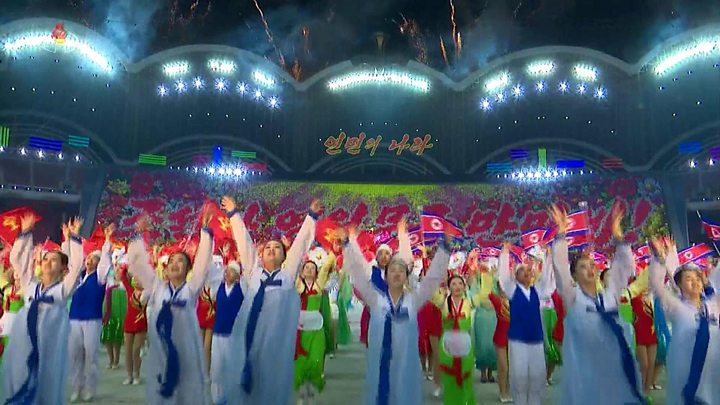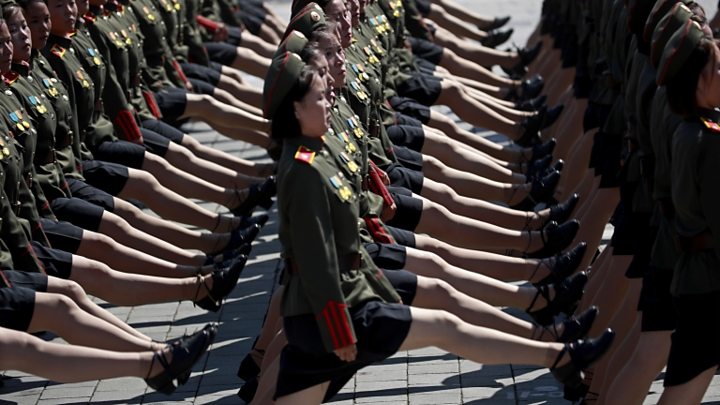North Korea's Mass Games 'paused' after Kim criticism

North Korea's most important propaganda event, the Mass Games, has been put on hold after criticism from the country's leader Kim Jong-un, tour firms say.
Young Pioneer Tour, a company which organisers trips to the hermit state, tweeted that the games "will be stopped from 10 June until further notice".
Koryo Tours, another North Korea specialist, also gave the same date. Pyongyang has so far made no comments.
On Monday, Mr Kim criticised the games for "their wrong spirit of creation".
After attending the opening day of the colourful and well-choreographed event, he also spoke of an "irresponsible work attitude", state media reported.
Mr Kim had already called earlier this year for a new approach to propaganda.
Correspondents say North Korea may be preparing for more economic and ideological isolation after talks with the US stalled.
What do tour firms say?
Young Pioneer Tours, which describes itself as a "leading travel company and experts in North Korea", said the Mass Games' suspension was "due to Kim Jong-un's dissatisfaction with the opening performance".
Meanwhile Koryo Tours said the spectacle would be "adjusted" before being relaunched.
Koryo Tours brands itself as "the experts in travel to rather unusual destinations", including North Korea.
North Korea's authorities have so far not confirmed that the games are to be paused.
What does Kim's criticism mean?
The games are a huge propaganda event featuring tens of thousands of participants, many of them children, in precisely synchronised moves.
This year it kicked off with what was supposed to be the beginning of a months-long propaganda festival, featuring enormous co-ordinated displays.
The event is designed to celebrate the country and boost morale, but Mr Kim's criticism is not unusual, analyst Minyoung Lee of NK Pro told the BBC.
"Kim Jong-un publicly criticises departments and poor work performance," she said, adding that his criticisms can range from public spectacles like the mass games to even mundane things like poor tree-planting.
Key to interpreting his criticism is the context of the past months. In March, Mr Kim said the country needed to do its propaganda in a "novel" way.
Since then, state media has increased its coverage of propaganda work and warned against "bourgeoisie ways of life" and "non-socialist phenomena", Ms Lee said.
Is Pyongyang under pressure?
The sudden focus on propaganda may seem like a surprise, but Pyongyang's efforts make sense when seen against the recent failure of US-North Korea talks.
When negotiations with the South and Washington began, the propaganda machinery scaled down its criticism of those two traditional enemies.
"Pyongyang may feel insecure about the ramifications of the diplomatic detente and softer anti-South Korea and anti-US rhetoric on the people's mindset," said Ms Lee.

Yet the current diplomatic stalemate means it is unclear if talks with the US will continue.
Sanctions relief seems out of reach for now and the North will have to prepare its population for what could be prolonged economic difficulties.
This means "hardening the people's minds against outside influences and promoting domestic unity," said Ms Lee.